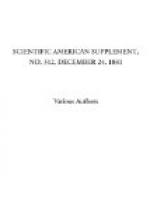The small amount of labor and cost of working the above apparatus will compare favorably with the production of the electric light from a dynamo-electric machine for the photographer, and when we consider that the cost of the whole of the above apparatus, consisting of a generator automatic lamp, reflector, and all the necessary appendages, is less then one-tenth of the dynamo machine, motor, shafting, etc., to produce the same result, it would seem to have a greater claim for its adoption with those who wish to employ the electric light, whether for work at night, use in the sitting room, or to assist daylight on the dark and foggy days of winter.
Fig. 2 shows the arrangement of the electric lamp. A is the automatic regulator; B, the reflector; C, top extension of the reflector; D, small tissue paper screen to prevent the intense arc-rays from coming in contact with the sitter; E, stand with sliding rod. This appendage can be wheeled about with ease, as it is arranged to run upon four casters.
When the generator is in use it may be placed within easy reach of the operator, so that the exposure may be made by lowering the elements in their troughs just for the requisite time, and withdrawing immediately the exposure is made; there is no need to fear any inconvenience from deleterious fumes as none are given off, so it may be used in any studio or sitting-room without any inconvenience from this source, and as far as many trials have gone, it seems to meet every requirement demanded by the photographer for the production of portraits by means of the electric light.—Photo. News.
* * * * *
DESRUELLES’S ELECTRIC LIGHTER
[Illustration: ELECTRIC LIGHTER.]
The little apparatus shown in the accompanying cut will certainly find favor with smokers, as well as with persons generally who often have need of a fire or light. It forms one of the most direct applications of dry piles of all the systems on the Desruelles plan. Instead of filling piles with a liquid, this plan contemplates the introduction into them of a sort of asbestos sponge saturated with an acid or any suitable solution. In this way there is obtained the advantage of having a pile which is in some sort dry, that may be moved, shaken, or upset without any outflow of liquid, and which will prove of special value when applied to movable apparatus, such as portable lighters, alarms on ships, railroads, etc. It is hardly necessary to say that while the introduction of this inert substance diminishes the volume of the liquid, the electro-motive force of the pile is thereby in nowise affected, but its internal resistance is increased. This, however, is of no consequence in the application under consideration. The lighter consists of a small, round, wooden box containing the pile, and surmounted by a spirit lamp. A platinum spiral




